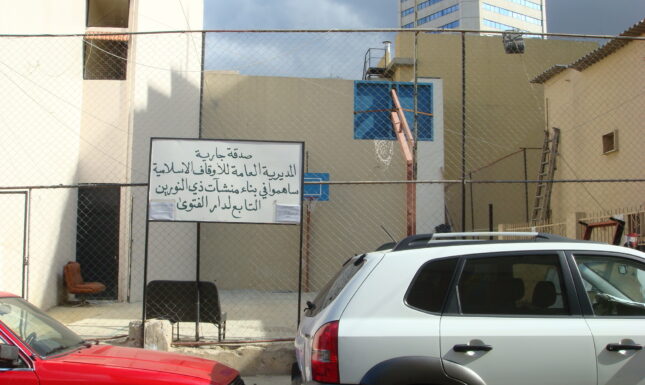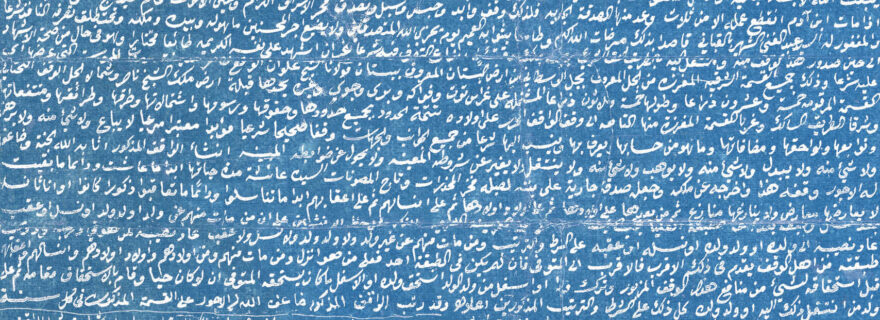Is the Waqf Islamic?
What do waqfs or charitable endowments tell us about forms of religiosity in society today? Nada Moumtaz provides answers, based on her recent book, God’s Property: Islam, Charity, and the Modern State
Can an Islamic government be democratic? Should the veil be allowed in secular public spaces? Is sharia compatible with human rights? These tired but nevertheless urgent questions have occupied studies of the Islamic revival, reflecting Western anxieties and Muslims’ own questioning interpellated by these anxieties. Other aspects of the revival, however, have received less attention – including those concerned with economic life, such as the resurgence of the waqf (charitable endowment). What can a study of this resurgence teach us about contemporary forms of Muslim religiosity?
In my book God’s Property: Islam, Charity, and the Modern State, I compare contemporary forms of the waqf in Beirut, Lebanon, to waqf practices in the Ottoman sharia court records of the nineteenth and early twentieth century. These earlier waqfs consisted mostly of buildings, rooms, shops, and land whose revenues supported mosques, Sufi lodges, the poor, or the families of founders. Most waqfs founded today are mosques, reflecting the transformation of waqf into a “religious” endeavour pertaining primarily to worship. My interlocutors often highlighted the many legal advantages of waqfs compared to other forms of association: the ease with which they can be created or the particular organ of the state that supervised them. Yet at the same time, they reminded me that for them, as Muslims, the waqf was one of three good deeds (alongside useful knowledge and a child who prays for them) that continues to bring rewards after one’s death, according to a Prophetic tradition. God’s Property thus situates the waqf amid a contemporary moment of Islamic revival, analyzing it as a charitable practice that brings Muslims closer to God in the hereafter without discounting its social, economic, political, and worldly purposes.

Many Muslims see the establishment of a waqf as a pious act, then, but is the waqf itself Islamic? Someone familiar with the Lebanese context might note that, today, Christian waqfs are actually much more plentiful than Muslim ones: some estimate that they constitute 25% of arable land in Mount Lebanon. Given that waqfs are legal instruments and are not unique to the Islamic tradition, and given that Christians (and Jews) could and did found waqfs (more than half the waqfs recorded in the Ottoman qadi court of Beirut were established by Christians), does approaching the waqf through the Islamic tradition rest on erroneous assumptions about the place of religion in the practice of waqf-making? Scholars of Islam face similar questions in other contexts, e.g., whether it makes sense to talk of "Islamic science" or "Islamic art".
Famously, Marshall Hodgson addressed these kinds of question by distinguishing between “Islamic” and “Islamicate”: the properly religious and that which pertains the larger cultural milieu that Islam produced, Hodgson discusses waqf as the institution that provided the “material foundation for most specifically Islamic concerns.” Because of his emphasis on the waqf’s function as a financing tool, Hodgson would likely consider waqfs more Islamicate than Islamic. Indeed, Hodgson considers the domain of the Islamic proper to be the religious, or “personal piety – that is, a person’s spiritual devotion.” This is an aspect of the waqf that Hodgson does not discuss. Such a distinction between the religious and the cultural, however, takes for granted certain Christian understandings of religion (religion=personal piety=spiritual). Could there be other ways of thinking the relation of the religious to the not-religious, and might waqfs help us see them?
More recently, Shahab Ahmed has suggested that any use of the “vocabulary of Islam” at a particular time and place to create meaning renders an action or a discourse Islamic. Given that the waqf was developed in relation to the “Text” of the revelation (mostly hadiths) and that it forms part of that “vocabulary,” Ahmed would probably have no qualms considering Christian waqfs Islamic. But referring to both Christian waqfs and Muslim waqfs as similarly Islamic obscures important differences in how waqfs can operate when Muslims found them as acts of charity. The fact that the waqf bears a family resemblance to trusts and endowments does not mean that waqf practices have similar effects across the various religious traditions they are part of.
Both Hodgson and Ahmed therefore miss something important concerning the nature of Islamic practices. Let me illustrate this with an example. Non-Muslim subjects can enter into sales and other pecuniary transactions defined in Islamic law, and these transactions have a similar value for both Muslims and non-Muslims. However, if such a transaction is conducted in submission to God, it becomes a way to get closer to God and to earn rewards in the hereafter. Similarly, while their worldly operation might be similar to that of other legal instruments, waqfs produce other effects for Muslims practicing them, as they fit into pious and pecuniary frameworks defined by Muslim jurists. In that sense, approaching waqfs as an Islamic practice does not mean that considering them only as an Islamic practice. Rather, it points to a different relation between the worldly and the religious, highlighting the often neglected “religious” dimension of worldly practices.
This distinction is one that also helps answer another question I often encounter in my work on waqfs. At talks, in reviews, and in casual conversation, someone will, without fail, ask: “Is the use of waqf [by founders] simply a strategic deployment of religion to achieve secular ends?” or “Doesn’t the emphasis on waqfs as spiritual, rather than legal or pragmatic, make undue assumptions about the intent of founders?” This is another way of asking whether the waqf is really Islamic, and another version of the Hodgsonian restriction of the Islamic to the “properly religious. It is a question that reflects secular reason and its recurrent urge to classify and separate activities, devices, and institutions into spheres, confining religion to the private realm. Such a framing was an important tool in state efforts to discipline waqfs, transforming them from worldly transactions that also produced otherworldly effects (as they clearly were in Ottoman Beirut) to a range of transactions that, starting in the early twentieth century, were classified either as “religious” (e.g., mosques) or as “economic” (in which case they could ostensibly be abolished without impinging on religious sentiments). Even within scholarly debate, the question reflects a similar secularist bias.
Here, by attending to the waqf’s importance as a way of getting closer to God, I do not mean to suggest that it is only a “religious” practice, but rather to provide a reminder that for Muslim practitioners, “religious reasons” matter. We dismiss them at our own peril if we want to gain a better understanding of why people choose to found waqfs today.
Further reading:
Nada Moumtaz. God's Property Islam, Charity, and the Modern State. Berkeley: University of California Press, 2021 (open access)



0 Comments